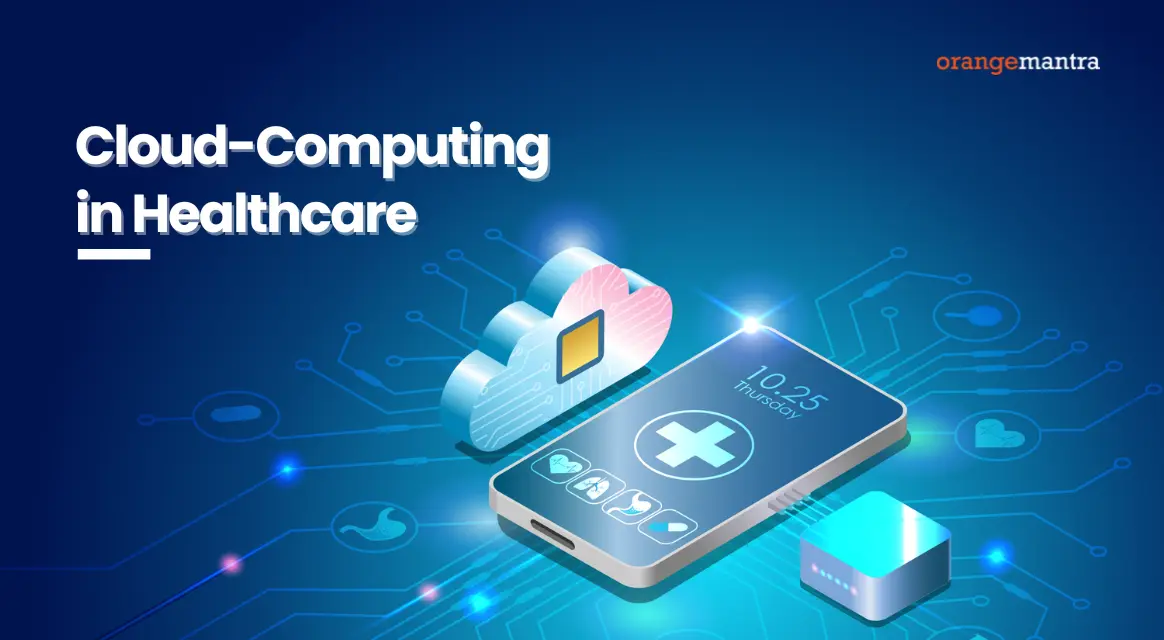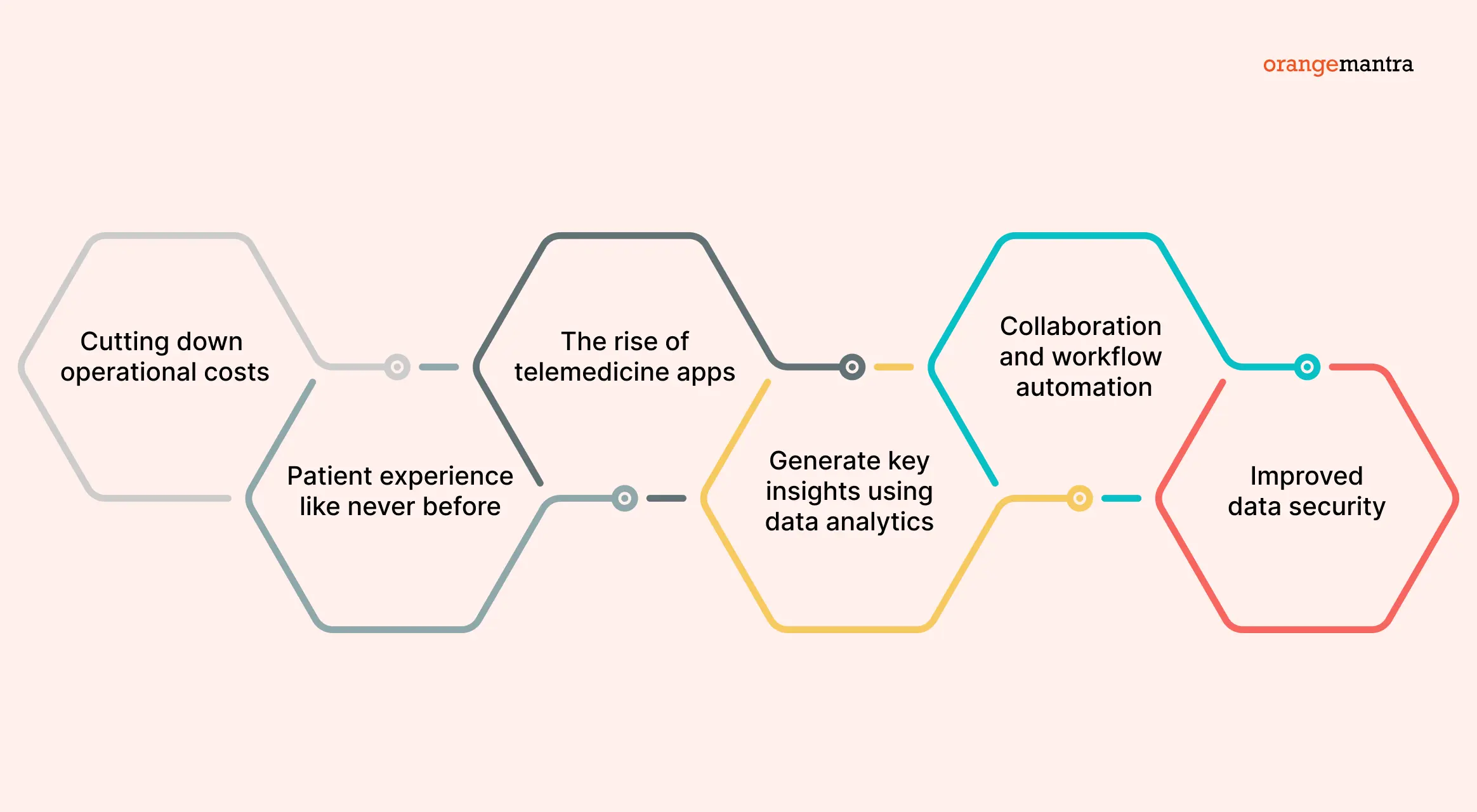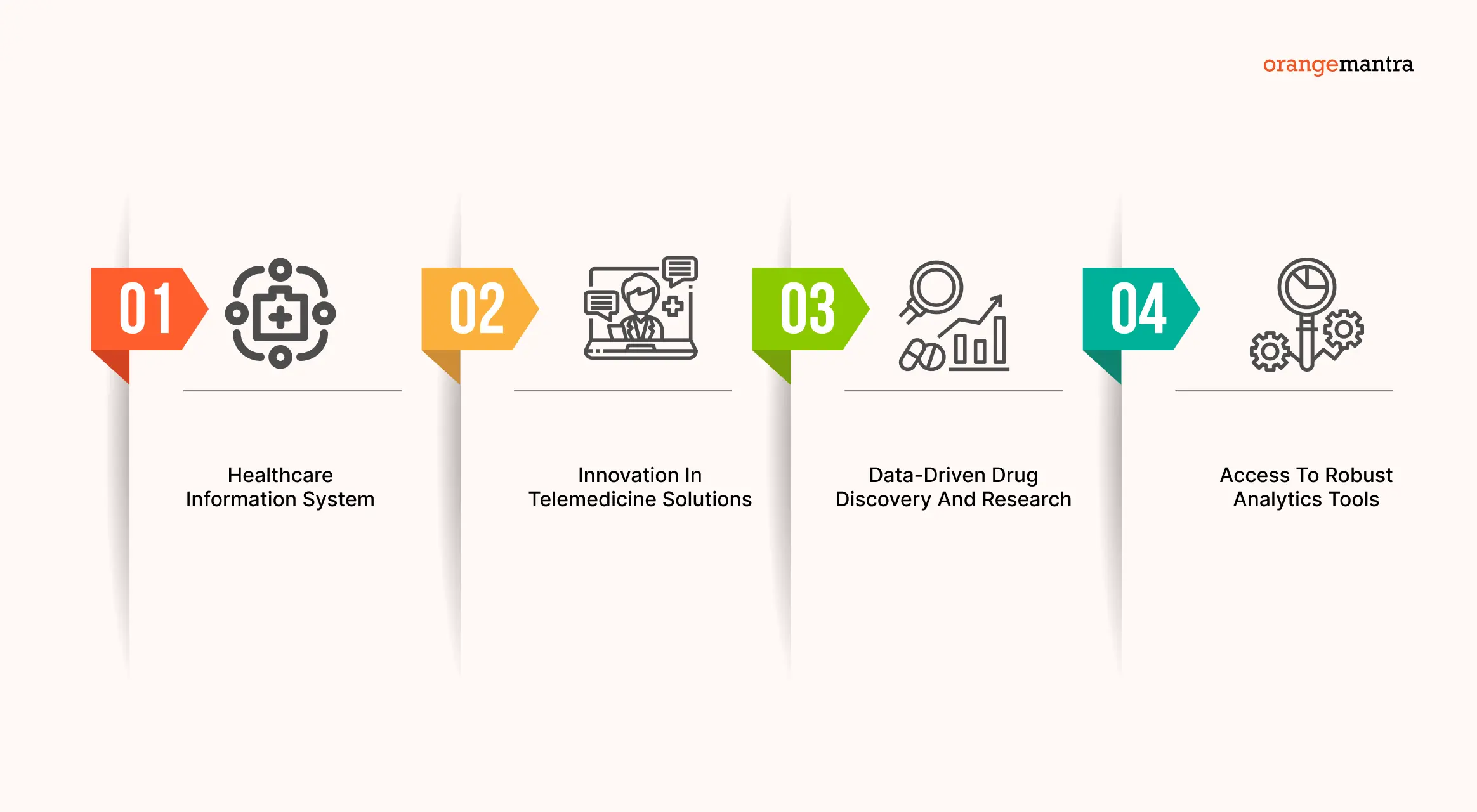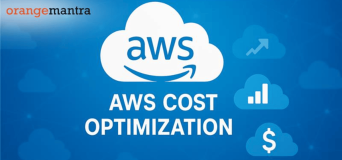
Here’s what you will learn:
Table of Contents
Cloud Computing in Healthcare: An Overview
The post-COVID era has seen the “digital innovation” adoption rate go through the roof within the entire healthcare ecosystem.
Emerging tech like Artificial Intelligence, Blockchain, IoT, etc. are the primary catalyst for unprecedented growth in this sector. However, cloud computing is the technology that adds a new dimension to these corporations’ tech-driven approach.
In 2023, where machine and manpower are collaborating to save millions of lives, use of cloud computing in healthcare can prove to be a game-changer.
The exciting concept is set to bring transformative changes to how doctors, researchers, pharmaceutical companies, and the entire healthcare community operates.
So, buckle up!
This guide takes a deep dive into this ground-breaking technology, jotting down the various types, benefits, and applications of cloud computing in healthcare.
Additionally, we learn how a competent healthcare software development company can assist organizations make healthcare more effective, intelligent, and accessible.
Let’s get started.
What is cloud computing? A basic introduction
Cloud computing in healthcare sector is integral to the overall “digital transformation” journey. The technology, by definition, refers to the utilization of remote servers to store, manage, and process patient data via the internet.
The robust solution helps medical stakeholders securely access information, collaborate in real-time, and deploy scalable computing resources for optimized practices.
Thanks to cloud computing, thousands of healthcare providers are achieving streamlined workflows, adopting process automation, and taking patient care to greater heights.
Not only that, but the groundbreaking technology is paving the way for data-driven medical research and innovation.
Stakeholders looking for flexibility, scalability, and cost-effectiveness are rapidly pivoting to a cloud environment by partnering with a healthcare software development company.
6 Key benefits of cloud computing in healthcare
“Is cloud computing a worthwhile investment?”, you might ask.
After all, a technology has to offer visible financial and operational perks to be considered worth adopting, right?
Well, we have the answer!
Below, we have listed six key benefits that cloud computing offers when paired with cutting-edge healthcare software development services
1. Cutting down operational costs
By nature, cloud computing eliminates the need to establish in-house infrastructure to manage and store data. Organizations no longer need to invest in installing hardware and servers from scratch, thus significantly trimming their operating costs.
Cloud technologies also enable on-demand, convenient access to a pool of task automation tools/apps that save time and money.
Finally, cloud providers ensure HIPAA compliance, saving companies from paying hefty fines imposed for breaching or violating HIPAA guidelines.
2. Patient experience like never before
Cloud technologies don’t just enable physicians to access medical records in real-time, patients can do the same. Thanks to data democratization, patients can avoid over-prescriptions and undergoing unnecessary medical tests.
Furthermore, ML and AI-empowered tools on cloud systems enable medical staff to detect symptoms and administer treatments ahead of time.
Through personalized healthcare and accurate diagnosis, patient experience is bound to improve.
3. The rise of telemedicine apps
Telemedicine apps offer added convenience to the overall delivery and healthcare experience for patients. In the post-pandemic world, the demand for telehealth technologies skyrocketed as patients started prioritizing receiving medical care remotely.
The real-time accessibility of key data offered by cloud computing empowers a medical center’s telemedicine offerings. Telehealth has allowed patients living in rural areas or with disabilities to access first-rate medical assistance.
4. Generate key insights using data analytics
Cloud based systems utilize predictive modeling and machine learning for data analytics. This has several benefits, including –
- Lowering treatment-related costs
- Generating key insights into patient’s medical history, ongoing prescription, etc.
- Detecting underlying symptoms ahead of time
- Identifying the most effective practices
- Improving product formulas based on effectiveness
- Creating a personalized treatment/insurance plan
- Predicting future trends for long-term growth
5. Collaboration and workflow automation
Gone are the days of relying on legacy systems to share and manage patient records – thus creating silos. Cloud computing fosters collaboration by establishing seamless data distribution across the hierarchy, irrespective of format or origin.
Furthermore, since cloud providers are integrating emerging technologies (such as AI, Blockchain, Machine Learning, etc.) into their services, healthcare providers can spend less time storing/managing data and more on providing the best medical care.
6. Improved data security
Earlier, when medical records were stored on paper, there was a greater risk of patients’ personal files being lost to theft or damage. Not only is it more efficient to store vast data sets on a cloud server, it’s also safer. Enterprises no longer have to store sensitive data on local, on-site servers.
Also, cloud computing comes with a host of security features to boost data security. Data encryption, access verification, identity recognition, data auditing, and automated patch updates ensure data confidentiality, thus enhancing patients’ trust.
To learn more about how companies can achieve digital transformation by moving to cloud, give our comprehensive guide a quick look
What are the challenges of cloud computing in healthcare?
Switching to the cloud opens new horizons for healthcare providers to revolutionize patient care. However, potential hazards may arise. Scrutinizing these Cloud computing in healthcare pros and cons allow healthcare brands to adopt the best solution for their needs.
Here are a few risks associated with cloud computing in healthcare that companies and cloud providers must collectively address:
1. Loss of productivity through downtime
While your data is secure on the cloud (for the most part), temporary downtime may still be incurred. In those instances, the responsibility lies with the cloud provider to get things up and running.
Healthcare providers may therefore encounter loss of productivity or worse, loss of patient trust. Therefore, choose a healthcare software development company with a rigid and well-defined strategy to curb downtime.
2. Poor data literacy causing lower adoption
Studies indicate that the primary reason for a relatively lower cloud adoption rate within the healthcare community is poor data literacy. Also, reputable hospitals fear security and privacy breaches when sharing patient data.
Also, there are integration challenges to consider. Transitioning to a cloud-based model may present several technological barriers. Finally, a general unwillingness to lose control of sensitive data has caused the medical sector to fall behind.
3. Security and compliance
Shifting to any technology may expose the corporation to a number of security and compliancy issues. Patient data is extremely confidential and must be safeguarded at all costs to prevent financial and legal troubles.
Encoded data encryption, SSL encryption, intrusion identification system, etc are some ways healthcare institutions can ensure data security against breaches.
4. Choosing the right cloud service provider
All cloud limitations mentioned above can be boiled down to one fatal flaw – not choosing a trusted cloud hosting provider.
The right healthcare software development services should help you adopt a flexible operational model. From ideation to implementation and maintenance, the cloud provider must help you navigate the entire ecosystem, choosing the best tools to optimize and streamline operations.
Here’s the takeaway
Many pain points connected to integration, security, and HIPAA compliance can be offset by investing in adequate cloud computing solutions.
Choosing proficient healthcare software development services goes a long way in preventing data breaches whilst cutting down operational expenses.
Emerging Trends in healthcare industry for 2024
As 2023 draws to the close, the role of cloud computing in healthcare will only become more prevalent.
Adapting to these emerging market trends will only help medical professionals around the globe simplify operations and improve patient experience.
There are the four emerging trends capable of driving healthcare innovation and enhancing patient experience in 2024:
1. Healthcare Information System
- Deployment of HIS (patient management systems, billing & invoicing tools, electronic health records, etc.)
- AR/VR integration in medical training
- Implementation of zero-trust security models
- Development of IoMT (Internet of Medical Things) devices
2. Innovation in telemedicine solutions
- Rise of telehealth and virtual care platforms.
- Remote consultation and virtual appointments
- Health monitoring using IoT and wearable devices
- Cloud-based EHR storage
- Virtual health assistants and chatbots
- Digital prescriptions via pharmacy integration
3. Data-driven drug discovery and research
- Computational drug design & discovery
- Molecular modeling, virtual image screening, treatment stimulation, etc.
- Drug research using AI and ML algorithms
- Genomic and proteomic analysis
- Biobanks and repositories management
4. Access to robust analytics tools
- Disease prevention via big data & predictive analysis
- Optimized patient monitoring using real-time data
- Blockchain integration for added security
- Healthcare analytics for improved decision making
- NLP for unstructured/semi-structured data
Here’s how the future of cloud computing in healthcare will look like in 2024 (and beyond). Healthcare providers must therefore keep these trends in mind to optimize their future offerings.
In Conclusion
Whether companies genuinely dream of making healthcare more patient-centric, or strictly look at it from a monetary standpoint, digital adoption is the key.
Cloud computing in healthcare sector is set to bring transformative changes to an increasingly tech-driven market sphere. However, to create an innovation-led cloud-based infrastructure for your facility, you need a certified team of consultants.
That’s where we come!
At OrangeMantra, the motto is simple – “Turn data into insights, and insights into deliverable actions.”
Our certified tech consultants deliver unparalleled value to healthcare professionals, patients, and startups using flexible engagement models.
Our healthcare software development services help you leverage ready-to-use cloud offerings that deliver instant results.
Frequently Asked Questions (FAQs)
Still have questions left answered?
No worries. We’ve covered the 3 most burning questions that medical professionals have pertaining to the adoption of cloud-based technologies.
Take a sneak peek.
Q1: What is cloud computing in healthcare?
Cloud computing in healthcare sector facilitates seamless access to patient data (medical history, prescriptions, surgical appointments). The relevant data is stored on the cloud via remote servers and can be retrieved/processed to administer adequate treatment.
Q2: What are the applications of cloud computing in the healthcare industry?
- Storing, exchanging, and retrieving patients’ electronic medical records without disruptions.
- Creating telehealth apps for delivering medicines, booking appointments, consulting a practitioner, etc.
- Full/semi workflow automation for reduced errors and downtime.
- Utilizing cloud computing for optimized drug delivery and medical research.
- Using data analytics to create personalized health care and insurance plans.
Q3: How does cloud computing help in healthcare?
- Improved patient experience
- Real-time accessibility to medical records
- Reduced data storage/handling cost
- Optimized research and innovation
- Faster time-to-market for pharmaceutical products




